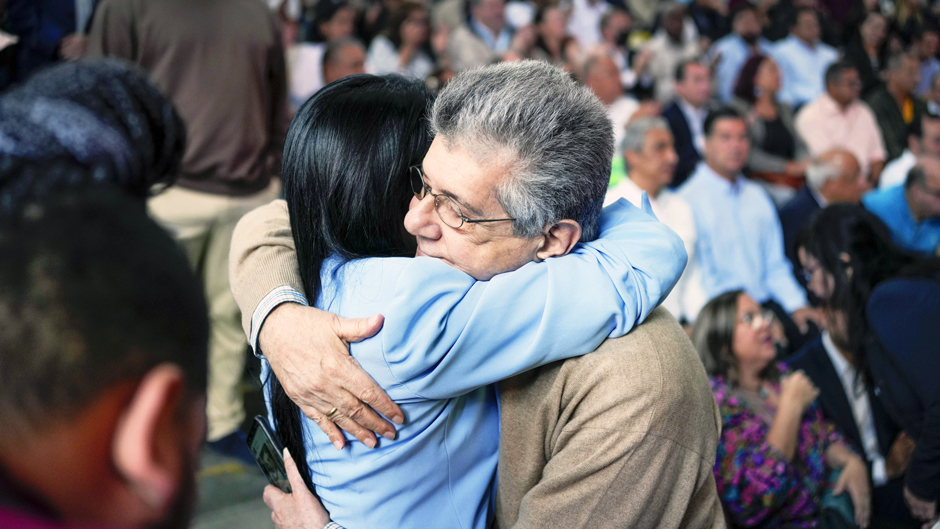What is the outlook for democracy in Latin America?
The news is mixed.
Such was the conclusion of a roundtable discussion, “Outlooks on the Quality of Democracy in Latin America and the Caribbean,” held on Friday at the Donna E. Shalala Student Center on the Coral Gables Campus.
Hosted as the first event by the George P. Hanley Democracy Center, the panel discussion was moderated by John Twichell, lecturer and director of Latin American Studies at the University of Miami. Panel participants were Calla Hummel, assistant professor of political science; Ileana Ros-Lehtinen, former member of the United States Congress and University alumna; and Daniel Pedreira, adjunct faculty member in political science.
Gregory Koger, professor of political science, gave the welcoming remarks. Lillian Manzor, faculty lead for the Institute for Advanced Study of the Americas, also addressed the audience of faculty members and students.
The event was co-sponsored by the Institute for Advanced Study of the Americas in partnership with the College of Arts and Sciences’ Department of Political Science and the Latin American Studies program.
Although Latin America has consolidated democracies in Argentina, Chile, Colombia, Costa Rica, the Dominican Republic, Mexico, Panama, and Uruguay, the region has several countries that are backsliding into autocratic governments, Twichell pointed out. Noting that it also contains a trio of dictatorships: Cuba, Venezuela, and Nicaragua.
“I am really worried about the future for Latin America,” said Ros-Lehtinen. “We’ve had free and fair elections [in many countries] but once they get elected many of these presidents rule with autocratic mandates.”
One of the most striking examples is in Nicaragua, where President Daniel Ortega has ruled for four consecutive terms and has changed the constitution to remain in power, she noted. Recently, the Nicaraguan government released 222 political prisoners from jail and forced them into exile as a way to provide a “safety valve” for its despotic regime, Ros-Lehtinen added. “They are getting rid of troublemakers because these are people who are advocating for freedom and democracy.”
She called Haiti “the Lebanon of the Caribbean,” a country that is ruled by armed gangs and is considered a failed state. “That is the extreme of what could happen,” she stated.
Hummel indicated that even in countries that are considered institutionalized democracies, the populace may not be content.
“If we talk to people in those countries with institutionalized democracies, none of them are going to say ‘my government is working great, our elections are fantastic, and our institutions are strong. And I feel represented,’ ” Hummel said.
Instead, Hummel explained that most citizens express a disgust with corrupt governments and politicians, political scandals, and gridlocks in legislative bodies.
“They are not seeing the changes that political campaigns promise,” Hummel said. “We don’t see governments delivering services that citizens expect from their governments.”
There are many countries that are struggling on issues not only of democracy, but on concerns of economic growth, employment, and education, Hummel added.
Hummel is optimistic about countries like Chile and Bolivia that seem to be holding to a steady economic growth, but is worried about El Salvador, where president Nayib Bukele is ruling with an authoritarian bent; Venezuela, a country ruled by leftist president Nicolas Maduro with a government that denies its populace basic human rights; and Haiti.
There was a “bare minimum standard of what democracy meant” when the transition to democracies in Latin America occurred in the late 1980s and early 1990s, according to Pedreira.
“It was considered that if the country had free elections and peaceful transfer of power, that constituted a democracy,” he said. “I think we have seen that that is not enough. We need to talk about democracies in terms of institutions and institutional strengths.”
Factors like the security of a country’s citizens also should be taken into consideration when talking about a democracy, Pedreira noted. He used Mexico as an example of a country considered democratic because free and open elections are held, but it’s a place where journalists are being killed. In many cases, these killings are done with impunity.
“When you talk about these issues you are talking about denying freedom of expression … and getting news out,” Pedreira explained.
Socialist leaning governments—such as the one in Colombia where former guerilla Gustavo Petro was elected president with the promise of decreasing poverty—encounter major challenges once in power including a divided congress, said Ros-Lehtinen.
“The economies are not working in the right way, and the people quickly become disillusioned,” she said. “The very people who put the people in power are now protesting against them,” because the politicians overpromised and then under-delivered.
In order to help many of these countries with their economies, the U.S. should play a role, the former member of Congress said. It has to take a stronger role in the region, she professed, by helping those countries directly and encouraging Free Trade Agreements with those countries that are interested.
“Yes, the U.S. must figure out a new approach to engagement with Latin America and the Caribbean because China is eating its lunch,” Twichell said.

